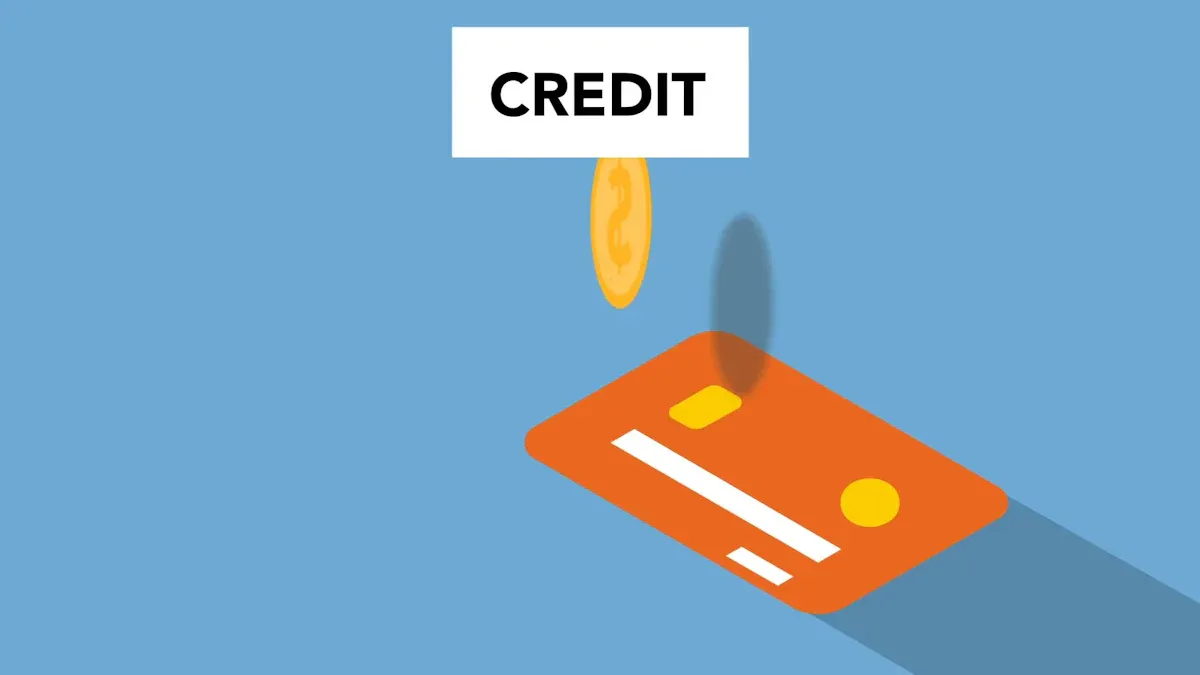Image Source: unsplash
Credit repair services assist individuals in resolving credit report issues and improving credit scores. These services often address errors, negotiate with creditors, and provide guidance on financial habits. Many people turn to them when struggling with poor credit or denied loan applications. Understanding the fee structures and effectiveness of credit repair services helps consumers make informed choices. Each service comes with unique costs and benefits, making it essential to evaluate options carefully before committing.
Key Takeaways
- Credit repair services help fix credit scores by correcting mistakes. They also talk to creditors and help with tough credit issues.
- Knowing how fees work is very important. Monthly plans, pay-for-results, and one-time payments cost differently. Pick the one that works best for you.
- Credit repair services are helpful but can’t promise success. True negative marks can’t be erased, and results depend on creditors’ help.
- Think about other options like fixing credit yourself or using nonprofit credit counseling. These choices can save money and help you manage money better.
- Good money habits, like paying bills on time and using less credit, are key to keeping a good credit score.
What Are Credit Repair Services?
Definition and Purpose
Credit repair services in the United States focus on identifying errors in credit reports and disputing inaccurate information with relevant organizations. These services aim to improve credit ratings for individuals facing credit issues, such as recent bankruptcies or loan denials. Unlike nonprofit credit-counseling services, credit repair companies operate as for-profit entities. Their primary purpose is to assist clients in addressing inaccuracies that negatively impact their credit scores.
Common Services Offered
Disputing Credit Report Errors
One of the core services provided by credit repair companies involves disputing errors on credit reports. These errors may include incorrect account details, outdated information, or fraudulent activity. Professionals in this field communicate with credit bureaus and creditors to ensure the removal of inaccuracies. This process can significantly improve a client’s credit score when successful.
Negotiating with Creditors
Credit repair services often negotiate with creditors on behalf of their clients. They may work to settle outstanding debts, reduce interest rates, or establish payment plans. These negotiations aim to make debt repayment more manageable and improve the client’s overall financial standing.
Providing Credit Counseling
Some credit repair companies offer credit counseling as part of their services. This involves educating clients on financial management, budgeting, and strategies to maintain a healthy credit score. While not all companies include this service, it can be a valuable resource for individuals seeking long-term financial stability.
Who Typically Uses Credit Repair Services?
Individuals with poor credit scores or those denied loans often turn to credit repair services. These services are particularly beneficial for people dealing with complex credit issues, such as identity theft or bankruptcy. Clients may also include those who lack the time or expertise to address credit report errors independently. By leveraging professional assistance, they aim to improve their financial opportunities.
Fee Structures of Credit Repair Services

Image Source: unsplash
Monthly Subscription Model
How It Works
The monthly subscription model is one of the most common fee structures used by credit repair services. Clients pay a recurring fee each month in exchange for ongoing credit repair assistance. These services often include disputing errors on credit reports, negotiating with creditors, and providing financial advice. This model allows clients to receive continuous support without committing to a large upfront payment.
Average Costs
Monthly subscription fees typically range from $50 to $150, depending on the company and the level of service provided. Over time, these fees can accumulate, making it essential for clients to evaluate whether the services justify the cost. For example:
- Some companies charge as low as $50 per month for basic services.
- Others may charge up to $150 for more comprehensive packages.
While this model offers flexibility, it may result in higher overall costs compared to one-time fees, especially for long-term subscriptions.
Pay-for-Performance Model
How It Works
The pay-for-performance model charges clients based on the results achieved. Instead of paying a fixed monthly fee, clients pay only when specific items, such as errors or negative marks, are successfully removed from their credit reports. This model appeals to individuals who prefer paying for tangible outcomes rather than ongoing services.
Average Costs
The cost of pay-for-performance services varies depending on the number of items removed and the complexity of the case. For instance:
- Removing a single collection from all three credit bureaus can cost up to $150.
- If 10 items are removed, the total cost could exceed $1,500.
This model ensures clients pay only for successful results, but it can become expensive for those with multiple issues on their credit reports.
One-Time Fees
How It Works
Some credit repair companies charge a one-time fee for their services. This fee typically covers the initial setup and a specific set of tasks, such as disputing errors or negotiating with creditors. Clients pay this fee upfront, and the company completes the agreed-upon work without requiring ongoing payments.
Average Costs
One-time fees usually range from $119 to $299, depending on the company and the services included. For example:
- Initial sign-up fees can range from $0 to $179.
- Some companies also charge additional monthly fees, ranging from $24.99 to $99, for continued support.
This model provides a clear cost structure, making it easier for clients to budget for credit repair services.
What Services Are Typically Included in These Fees?
Credit repair companies offer a range of services as part of their fee structures. These services aim to address credit report issues and improve credit scores. The specific services included often depend on the type of package selected by the client.
- Basic Services:
Most companies include credit bureau disputes, access to three-bureau reports and scores, and one-on-one consultations. Clients also gain access to online portals and credit score trackers. These features help individuals monitor their progress and stay informed about their credit status. - Advanced Services:
Full-service packages often include additional features like creditor interventions, debt validation letters, and cease-and-desist letters. Companies may also assist with correcting personal information errors and provide tools for building credit. These services cater to individuals with more complex credit issues. - Premium Services:
Premium packages typically offer all the services in basic and full-service plans, along with monthly inquiry disputes. This option is ideal for clients seeking comprehensive credit repair solutions.
The table below outlines common package types and their associated fees:
| Package Type | Monthly Fee | Included Services |
|---|---|---|
| Basic | $79 | Credit bureau disputes, three-bureau reports and scores, one-on-one consultations, online client portal, credit score tracker. |
| Full Service | $99 | Everything in Basic, plus creditor interventions, debt validation letters, cease and desist letters, personal information correction letters, credit-building tools. |
| Premium | $119 | Everything in Full Service, plus monthly inquiry disputes. |
Clients should carefully evaluate these packages to determine which one aligns with their needs. While basic services address common credit report errors, premium options provide more extensive support for challenging cases.
💡 Tip: Before committing to a service, individuals should review the fee structures and ensure they understand what is included. This helps avoid unexpected costs and ensures the chosen package meets their requirements.
By understanding the services included in these fees, consumers can make informed decisions about credit repair options. This knowledge is essential for navigating the fee structures and effectiveness of credit repair services.
Effectiveness of Credit Repair Services

Image Source: pexels
Benefits of Using Credit Repair Services
Expertise in Credit Laws and Disputes
Credit repair services provide professional expertise in analyzing credit reports and disputing errors. These companies understand credit laws and know how to navigate the complexities of credit reporting systems. Their knowledge allows them to identify inaccuracies and take appropriate steps to correct them. This expertise empowers individuals to address credit issues effectively and improve their financial standing.
💡 Note: Recognizing the importance of credit repair can help individuals achieve long-term financial success.
Time-Saving for Consumers
Credit repair services save consumers significant time and effort. Professionals handle the heavy lifting, such as filing disputes and negotiating with creditors. These tasks can be overwhelming for individuals unfamiliar with credit laws or dispute processes. By outsourcing these responsibilities, consumers can focus on other priorities while professionals work to improve their credit scores.
Limitations of Credit Repair Services
No Guarantees of Success
Credit repair services cannot guarantee results. They cannot legally remove accurate information from credit reports, which limits their ability to resolve certain issues. Additionally, the success of disputes depends on cooperation from creditors and credit bureaus. Consumers should approach these services with realistic expectations.
Limited to Correcting Errors, Not Financial Habits
While credit repair services address inaccuracies, they do not tackle underlying financial habits. Poor spending or payment behaviors can continue to harm credit scores even after errors are corrected. Long-term credit improvement requires individuals to adopt better financial practices, such as paying bills on time and reducing debt.
Factors That Influence Effectiveness
Accuracy of Credit Report Information
The accuracy of credit report information plays a critical role in the effectiveness of credit repair services. Accurate data ensures lenders can evaluate a borrower’s creditworthiness fairly. However, disputes over accurate information can complicate the process and strain relationships with creditors. Fraudulent disputes may also undermine the integrity of the credit reporting system.
Cooperation from Creditors
The willingness of creditors to cooperate significantly impacts the success of credit repair efforts. Some creditors may respond promptly to disputes, while others may delay or reject requests. Effective communication between credit repair companies and creditors is essential for resolving issues and improving credit scores.
📌 Tip: Consumers should verify the accuracy of their credit reports before seeking credit repair services. This step can streamline the process and improve outcomes.
Legal Considerations and Avoiding Scams
Understanding the Credit Repair Organizations Act (CROA)
The Credit Repair Organizations Act (CROA) protects consumers from unethical practices by credit repair companies. This federal law ensures transparency and fairness in how these organizations operate.
Key Protections for Consumers
The CROA provides several safeguards to protect consumers. These include:
- Prohibition of upfront fees: Companies can only charge after completing their services.
- No excessive charges: Organizations cannot impose unreasonable fees.
- Truthful representation: Misleading statements to credit reporting agencies are prohibited.
- Identity alteration: Advising consumers to alter their identity for better credit is illegal.
- Written contract requirement: A written agreement with clear disclosures is mandatory.
- Right to cancel: Consumers must have the option to cancel the contract in writing.
| Key Consumer Protections under CROA | Description |
|---|---|
| Prohibition of Upfront Fees | Credit repair organizations can only charge after services are rendered. |
| No Excessive Charges | Organizations cannot impose excessive fees for their services. |
| Truthful Representation | Misleading statements to credit reporting agencies are prohibited. |
| Identity Alteration | Advising consumers to alter their identity for better credit is not allowed. |
| Written Contract Requirement | A written contract with specific disclosures is mandatory. |
| Right to Cancel | Consumers must have a written right to cancel the contract. |
Prohibited Practices by Credit Repair Companies
The CROA also outlines practices that credit repair companies must avoid. These include:
- Charging upfront fees before delivering services.
- Making false or misleading statements to credit agencies.
- Advising clients to alter their identity to improve credit.
- Failing to provide a written contract with required disclosures.
Red Flags to Watch Out For
Consumers should remain vigilant when evaluating credit repair companies. Certain warning signs often indicate scams.
Promises of Instant Results
Legitimate credit repair companies cannot guarantee immediate results. Promises to remove all negative items from credit reports, regardless of accuracy, are unrealistic and often fraudulent.
Requests for Upfront Payments
Companies demanding payment before providing services violate the CROA. This practice is a major red flag and should prompt consumers to look elsewhere for assistance.
How to Verify a Legitimate Credit Repair Company
Consumers can take steps to ensure they work with a reputable credit repair organization.
Checking Licenses and Certifications
Verifying a company’s licenses and certifications is essential. Legitimate organizations comply with state and federal regulations and often display their credentials publicly.
Reading Reviews and Testimonials
Online reviews and testimonials provide valuable insights into a company’s reputation. Consumers should look for consistent positive feedback and avoid companies with numerous complaints or unresolved issues.
💡 Tip: Always research a credit repair company thoroughly before signing a contract. This step can help avoid scams and ensure a positive experience.
Alternatives to Credit Repair Services
DIY Credit Repair
Steps to Dispute Errors on Your Own
Individuals can address credit report errors without professional help by following a structured process. First, they should obtain a copy of their credit report from the three major credit bureaus: Experian, Equifax, and TransUnion. Reviewing the report for inaccuracies, such as incorrect account details or outdated information, is the next step. Once errors are identified, individuals can prepare dispute letters and send them to the respective credit bureaus. These letters should include supporting documentation, such as account statements or proof of payment, to strengthen the case. Monitoring the progress of disputes ensures timely resolution.
Free Resources for Credit Improvement
Several free resources can assist individuals in improving their credit scores. The Federal Trade Commission (FTC) provides guidelines for disputing errors and understanding credit laws. Websites like AnnualCreditReport.com offer free access to credit reports, enabling individuals to monitor their credit health. Additionally, nonprofit organizations and community programs often provide workshops and tools for financial literacy. These resources empower individuals to take control of their credit without incurring costs.
💡 Tip: DIY credit repair is cost-effective and promotes personal empowerment, but it requires time and knowledge of credit laws.
Nonprofit Credit Counseling Services
How They Differ from Credit Repair Companies
Nonprofit credit counseling services differ significantly from for-profit credit repair companies. Nonprofits focus on public service and aim to assist individuals in financial distress. They often provide services at little or no cost, depending on the client’s financial situation. In contrast, for-profit companies prioritize revenue generation and charge various fees, including upfront and monthly maintenance costs. Nonprofit agencies also emphasize education and long-term financial stability, while for-profit companies concentrate on resolving immediate credit issues.
Benefits of Nonprofit Services
Nonprofit credit counseling agencies offer several advantages. They provide unbiased guidance tailored to the client’s financial needs, ensuring transparency and trust. These agencies often conduct educational programs to enhance financial literacy within communities. Their mission-driven approach prioritizes long-term financial health over short-term gains. Additionally, stricter regulations govern nonprofit organizations, ensuring ethical practices and fostering confidence among clients.
Building Better Financial Habits
Paying Bills on Time
Paying bills on time plays a crucial role in maintaining a healthy credit score. Lenders view timely payments as a sign of reliability, which reduces the perceived risk of lending. Consistent on-time payments also prevent penalties and late fees, which can accumulate and harm financial stability. Moreover, individuals who pay bills promptly experience less stress related to financial management, contributing to overall well-being.
Reducing Credit Utilization
Lowering credit utilization is another effective strategy for improving credit scores. Credit utilization refers to the percentage of available credit that an individual uses. Keeping this ratio below 30% demonstrates responsible credit management and positively impacts credit scores. Strategies to reduce utilization include paying down existing balances and avoiding unnecessary new debt. Regularly monitoring credit card usage helps individuals maintain a healthy credit profile.
📌 Note: Building better financial habits requires consistency and discipline, but it leads to long-term credit health and financial stability.
Credit repair services offer valuable assistance in addressing credit report inaccuracies and improving credit scores. However, they come with costs and limitations. Consumers should carefully evaluate the fee structures, service offerings, and success rates of these companies to find the right fit. While these services provide expert insights and quicker resolutions, outcomes are not guaranteed. Alternatives like self-disputes, nonprofit credit counseling, and structured debt repayment plans can also help improve credit. Adopting better financial habits, such as paying bills on time and reducing credit utilization, remains essential for long-term credit health.
💡 Tip: Repairing credit independently requires time and effort but can be cost-effective. For those seeking professional help, understanding the fee structures and effectiveness of credit repair services is crucial.
FAQ
What is the typical duration for credit repair services to show results?
The duration varies depending on the complexity of the case. Most clients see noticeable improvements within three to six months. However, resolving more complex issues, such as identity theft or multiple disputes, may take longer.
Are credit repair services legal in the United States?
Yes, credit repair services are legal. They must comply with the Credit Repair Organizations Act (CROA), which ensures transparency and protects consumers from unethical practices. Consumers should verify a company’s legitimacy before engaging its services.
Can accurate negative items be removed from a credit report?
No, accurate negative items cannot be removed legally. Credit repair services can only dispute errors or inaccuracies. Accurate information remains on the credit report until it naturally expires, typically after seven to ten years.
How can consumers monitor their credit repair progress?
Consumers can monitor progress by regularly checking their credit reports through free resources like AnnualCreditReport.com. Many credit repair companies also provide online portals and credit score trackers to help clients stay updated on their credit status.
Is it possible to repair credit without professional help?
Yes, individuals can repair credit independently. They can dispute errors directly with credit bureaus, use free resources for guidance, and adopt better financial habits. DIY credit repair requires time, effort, and knowledge of credit laws but can be cost-effective.




